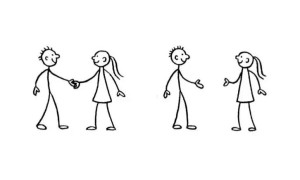虽然劝告我们,“伤心的人别听慢歌”,可是还是有很多深受情伤的男男女女一边听着悲伤的音乐,一边默默落泪。那么伤心时到底应不应该听慢歌?心理学研究给出了答案:听悲伤的音乐可以治愈受伤的心灵,帮助你尽快走出阴霾。
A broken heart. A sad ending to a love affair. That’s something most of us have experienced, or probably will. After all, it’s part of human life; needed, at least one time, to become more fully adult. But no question, the experience can be devastating, crushing.
爱情的悲剧让人心碎。大多数人都有过这种经历,或者可能会经历。毕竟,为爱心碎是人生的一部分,至少需要经历一次,才能变得更成熟。但毫无疑问,这种经历可能是毁灭性的。

But research shows there are pathways through the heartache. Listening to sad music is a major one. It can help you begin to feel joy and hopefulness about your life again. It can activate empathy and the desire to connect with others—both avenues through the prison of heartache and despair.
但研究表明,心痛是可以治愈的。听悲伤的音乐就是其中一种治愈方式。它可以帮助你重新感受生活的喜悦和希望,可以激活同理心和与他人联系的欲望,这两者可以帮助你走出心碎绝望的牢笼。
Sad music can help heal and uplift you from your broken heart. A recent study from Germany found the emotional impact of listening to sad music is an arousal of feelings of empathy, compassion, and a desire for positive connection with others. That, itself, is psychologically healing. It draws you away from preoccupation with yourself, and possibly towards helping others in need of comfort.
悲伤的音乐可以帮助你治愈受伤的心灵。德国最近的一项研究发现,听悲伤的音乐对情绪的影响是激发同理心、同情心和与他人建立积极联系的欲望。这本身就是心理治疗,能让你不再沉浸在自己的世界,而是可能去帮助那些需要安慰的人。
Another experiment, from the University of Kent, found that when people were experiencing sadness, listening to music that was “beautiful but sad” enhanced their mood. In fact, it did so when the person first consciously embraced their awareness of the situation causing their sadness, and then began listening to the sad music. That is, when they intended that the sad music might help, they found that it did.
肯特大学的另一项实验发现,当人们感到悲伤时,听“美丽但悲伤”的音乐会振奋他们的情绪。事实上,当一个人第一次有意识地面对自己的悲伤,然后开始听悲伤的音乐时,就会这样。也就是说,当他们打算靠悲伤的音乐“疗伤”,他们发现确实可以被治愈。
These findings link with other studies that show embracing your sad situation emotionally—accepting reality as it is—stirs healing and growth beyond it. In short, acknowledging your full experience arouses hope—another seeming paradox. For example, research from Cornell University, described here and published in Psychological Science, found that embracing discomfort about a life experience or new situation, and viewing it as a step towards growth and change, generates motivation to find a pathway through it, beyond it. As Churchill famously said, “If you’re going through hell, keep going.” That discomfort points you towards creating a plan, a new action. It fuels hope.
这些发现与其他一些研究相关,这些研究表明,接纳你的悲伤情绪,认清现实,会激发愈合和成长。简而言之,承认自己的全部经历会激起希望,这似乎是另一个悖论。例如,康奈尔大学发表在《心理科学》上的研究发现,接受生活经历或新情况带来的不适感,并将其视为迈向成长和改变的一步,会让人们产生走出来的动力。正如丘吉尔的名言:“如果你正在经历地狱,请继续前进。” 这种不适会引导你制定一个计划,一个新的行动。它点燃了希望。







